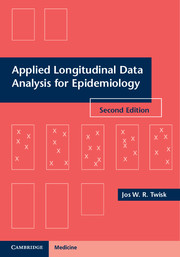Book contents
- Frontmatter
- Contents
- Preface
- Acknowledgements
- 1 Introduction
- 2 Study design
- 3 Continuous outcome variables
- 4 Continuous outcome variables – relationships with other variables
- 5 The modeling of time
- 6 Other possibilities for modeling longitudinal data
- 7 Dichotomous outcome variables
- 8 Categorical and “count” outcome variables
- 9 Analysis of experimental studies
- 10 Missing data in longitudinal studies
- 11 Sample size calculations
- 12 Software for longitudinal data analysis
- 13 One step further
- References
- Index
2 - Study design
Published online by Cambridge University Press: 05 May 2013
- Frontmatter
- Contents
- Preface
- Acknowledgements
- 1 Introduction
- 2 Study design
- 3 Continuous outcome variables
- 4 Continuous outcome variables – relationships with other variables
- 5 The modeling of time
- 6 Other possibilities for modeling longitudinal data
- 7 Dichotomous outcome variables
- 8 Categorical and “count” outcome variables
- 9 Analysis of experimental studies
- 10 Missing data in longitudinal studies
- 11 Sample size calculations
- 12 Software for longitudinal data analysis
- 13 One step further
- References
- Index
Summary
Introduction
Epidemiological studies can be roughly divided into observational and experimental studies (Figure 2.1). Observational studies can be further divided into case-control studies and cohort studies. Case-control studies are never longitudinal, in the way that longitudinal studies were defined in Chapter 1. The outcome variable Y (a dichotomous outcome variable distinguishing “case” from “control”) is measured only once. Furthermore, case-control studies are always retrospective in design. The outcome variable Y is observed at a certain time-point, and the covariates are measured retrospectively.
In general, observational cohort studies can be divided into prospective, retrospective, and cross-sectional cohort studies. A prospective cohort study is the only cohort study that can be characterized as a longitudinal study. Prospective cohort studies are usually designed to analyze the longitudinal development of a certain characteristic over time. It is argued that this longitudinal development concerns growth processes. However, in studies investigating the elderly, the process of deterioration is the focus of the study, whereas in other developmental processes growth and deterioration can alternately follow each other. Moreover, in many epidemiological studies one is interested not only in the actual growth or deterioration over time, but also in the longitudinal relationship between several characteristics over time. Another important aspect of epidemiological observational prospective studies is that sometimes one is not really interested in growth or deterioration, but rather in the “stability” of a certain characteristic over time. In epidemiology this phenomenon is known as tracking (Twisk et al., 1994, 1997, 1998a, 1998b, 2000).
- Type
- Chapter
- Information
- Applied Longitudinal Data Analysis for EpidemiologyA Practical Guide, pp. 6 - 15Publisher: Cambridge University PressPrint publication year: 2013



